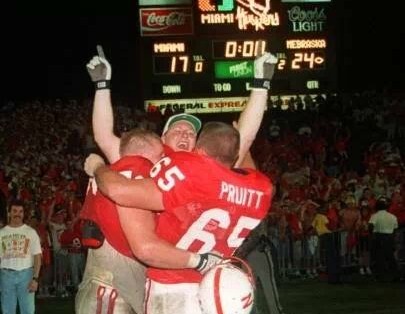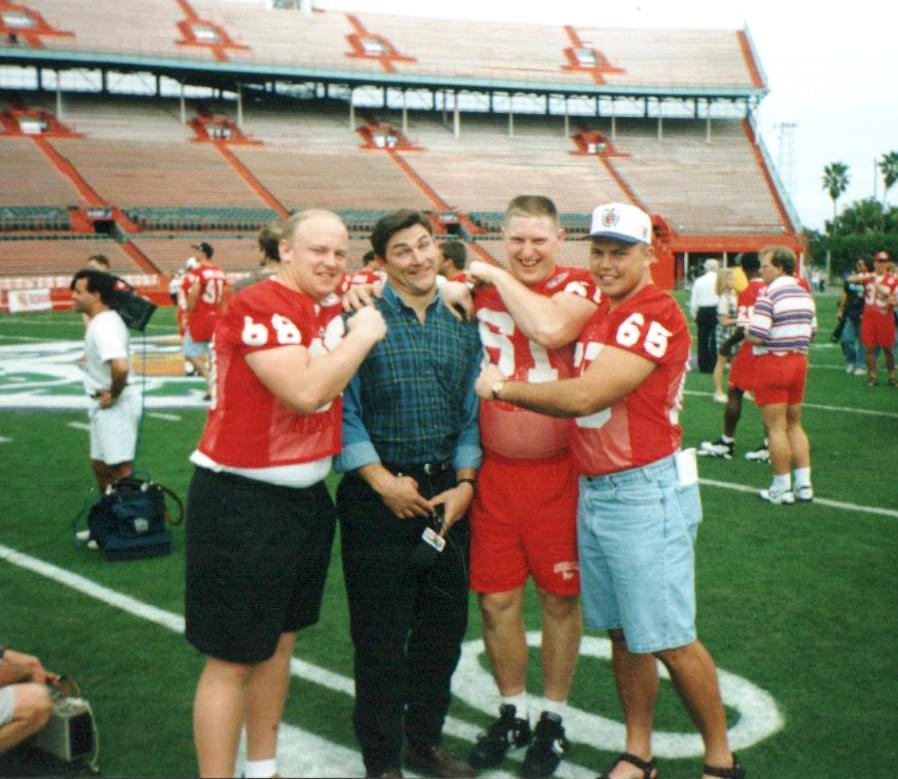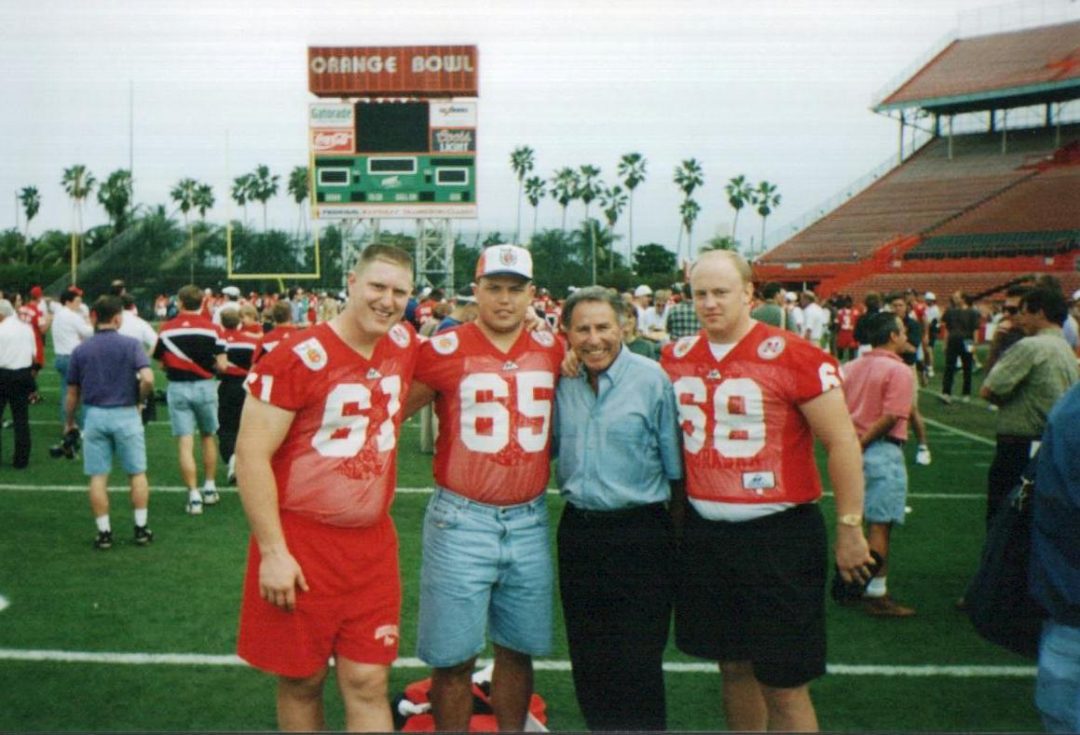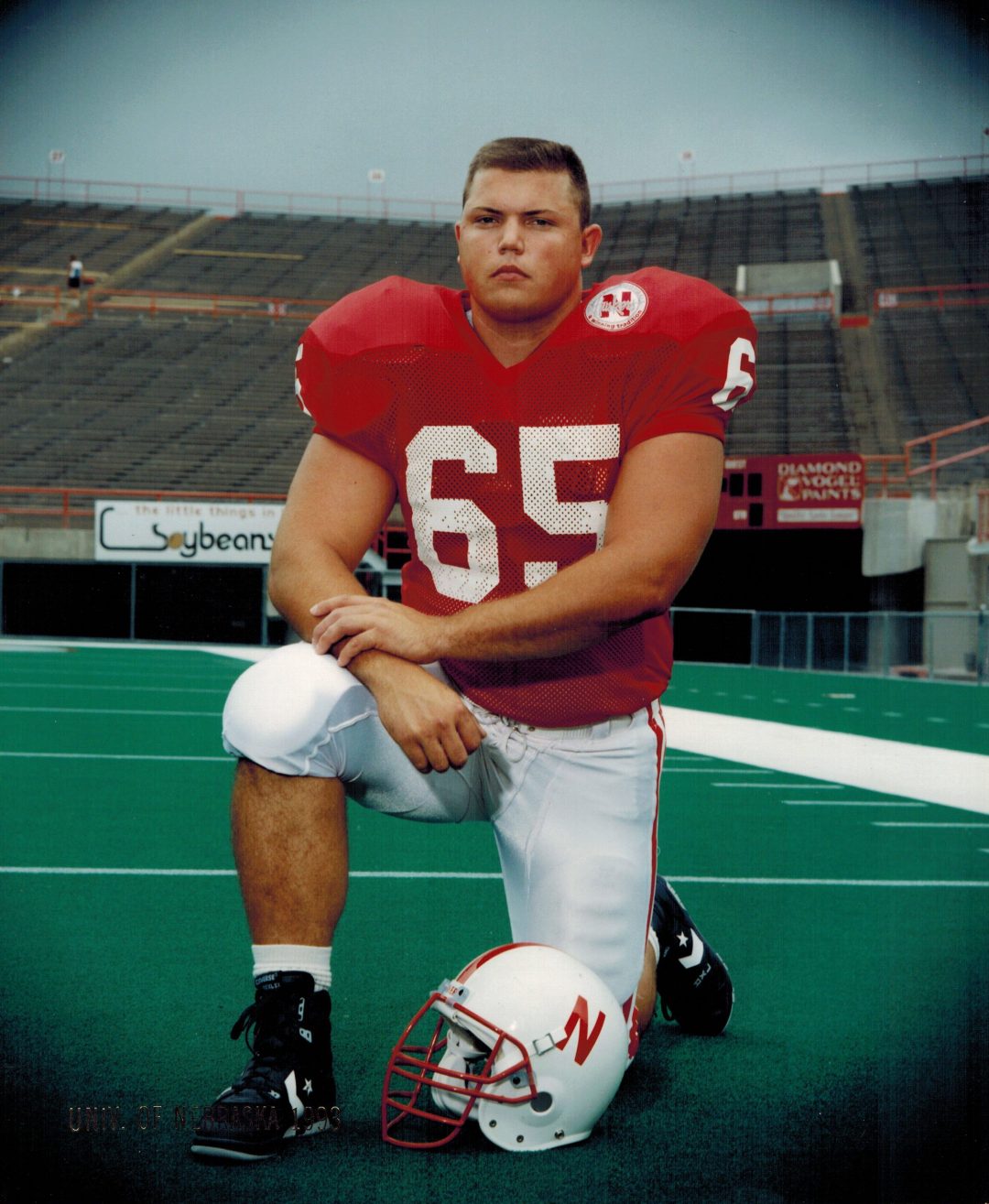Anatomy of an Era: Bryan Pruitt Part 1

Excerpted from Chapter 3, No Place Like Nebraska: Anatomy of an Era, Vol. 1
Chicago Police Officer Jim Malone: You wanna know how to get Capone? They pull a knife? You pull a gun. He sends one of yours to the hospital? You send one of his to the morgue. That’s the “Chicago Way”! And that’s how you get Capone! Now, do you want to do that? Are you ready to do that?
Federal Agent Eliot Ness: I have sworn to capture this man with all legal powers at my disposal and I will do so.
Chicago Police Officer Jim Malone: Well, the Lord hates a coward.
– David Mamet, The Untouchables
One thing I recall about the Pipeline’s Bryan Pruitt was his gritty, honest, tell-it-like-it-is Chicago style, as well as his nose-to-the-grindstone work ethic. He’s our third Husker Football walk-on in a row. Although never in the starting lineup, he nevertheless had a profound influence on his teammates both by his desire to contribute as well as his driven attitude.
This may be a poor attempt at stereotyping, but deep in his heart Bryan was and always will be a scrapper/underdog. His present day job on a SWAT Team seems the perfect fit. I’m glad he’s the guy kicking down doors and gunning for the bad guys in my stead.
Notable quote #1:
“We were (huddled up only) 3 yards from the ball. We couldn’t wait to get the snap off.”
Bryan Pruitt Part 1
Walk-on, Offensive Guard, Midlothian, Illinois (St. Laurence)
Where are they now? Illinois, Law Enforcement
Bryan Pruitt: Let me ask you about your book… that was nothing but blue-collar athletes going to work every day -nothing flashy- and we just went to work. Is that the approach the other guys are giving you?
Question: I just recall all the guys came to the practice field with the notion that they were going to show up and bring the full load every day, punch the other guy in the mouth hard enough to make him think about quitting, and then hang around to find if Saturday proved any tougher.
BP: My senior year in ’94, Coach Osborne decided that it was time to increase the number of plays we were running. I don’t know if you remember in the ‘80’s and the early ‘90’s: the big thing for offense was that they used to huddle up 10-15 yards off the ball… well, look at the ‘94 team. Nobody may have noticed this or paid attention on the game film, but we were 3 yards from the ball. We couldn’t wait to get the snap off.
Q: Were you part of the original ‘Pipeline’?
BP: Some people, being away from it in Illinois, they only want to know if you started. I was second team, so to them it’s no big deal. But getting back to the question, it was just wanting to go out and it not mattering who lined up in front of us…I kind of think that ties into with when we were huddling up 3 yards off the ball. It was the kind of, “Hey, we’re gonna run the football, and we don’t care if you know were gonna run the football…we’re gonna run it there.”
We didn’t try to cover up audibles and stuff like that. ‘Two opposite’ was our big audible. Like Peyton Manning does, trying to cover up audibles and stuff like that? No, Tommie Frazier just basically said ‘two opposite,’ which meant the run was just going the other way, or he’d call the play at the line. The other team knew what the play was, but we just went ahead and ran it and dared ‘em to stop us. ‘Two opposite’ was like this: say we were going to run a counter sweep -Tom’s big running plays were the inside traps, options, counter sweeps. Say we were gonna run a 48 Counter Sweep, which means our left guard and tackle are pulling around the left end. We would just call ‘two opposite,’ so as soon as you heard two opposite you just knew the play was going the other way.
It was just the reverse of what you heard in the huddle. Coach Osborne did such a great job of simplifying things for everybody and not making it so complicated that you couldn’t think of what you were doing. It doesn’t get any simpler than ‘two opposite.’
Q: And the opposing defenses knew what it meant?
BP: Yeah, and I don’t ever remember changing it at all throughout the year. Like I said, we weren’t really trying to hide anything.

Making ESPN’s Craig James pay for doubting the Huskers (Unknown/Uncredited)
Q: Do you remember a defining ‘Nebraska moment’ that stands out to you as far as the championships go?
BP: My first exposure to it was right after Nebraska lost to Georgia Tech in the Citrus Bowl. I remember Georgia Tech just kicked our tail, and my first meeting with them was right before spring ball and weightlifting and all of that. But the biggest thing I remember is some coaches talked, and then Boyd Epley stood up in front of everybody. And for whatever reason, the thing that stuck out to me was, he said, ”The biggest problem we have right now in this room is we have the “Have to be’s“ and the “Want to be’s.”
I don’t know if you remember that speech, Paul, but he was basically calling everybody out and saying that there were guys who went to do their lifting because they ‘have to be’ there. And what he wanted to do was get rid of those guys and just have guys that ‘wanted to be’ there. That was something. I’ve always kept that in my head. For whatever reason, that just stuck out to me, because how true was that? Even with work or whatever, as you go on, there’s a guy that has to be there and doesn’t want to be there -and there are guys who want to be there- and it makes a difference.
Q: I remember a week or two after that Georgia Tech game. It was actually the first time in what -20 years?- we finished out of the top 20 in one of the polls? And Boyd -you‘ve got to know this- Boyd loved holding meetings. I remember he walked into our strength staff meeting and he was just livid. He’s red in the face and pounding the table with his fists, letting out a few swear words, and even his hair is getting messed up! (laughs) In his mind you could see that he made the distinction that we had to somehow become a team of ‘Want to be’s’ if we ever expected to live up to the hopes that Nebraska football wanted to reach, you know? We were never gonna let it get this bad again, right? I considered that the low point of the organization. Would you agree?
BP: Yes. And if you remember, everybody was calling for Tom’s head. They said he couldn’t win the big one and it was time for a change. They wanted his head. And I’ve gotta be honest -I don’t remember any specific names now- there were some guys who worked, but they didn’t work nearly as hard as some of the guys on the ’93-and-after teams worked.
Q: And the Unity Council?
BP: I think it helped weed out some guys. It made everyone accountable.
Q: Was there a mindset being changed? Was there anything done comparing ‘94 to ’90 that you recall?
BP: I don’t know if I can put my finger on it. But I think the guys on the team started to learn how to do things better. They started to learn how to prepare to do some work. Then (sports psychologist) Jack Stark came in, and then (nutritionist) Dave Ellis came in, and it was just a complete mindset across the board with Keith Zimmer and Dennis Leblanc in academics. The whole program just did a 360.
They said, ”This is how we did things in the past, but those didn’t exactly work, so we’re going to change things.” I remember academics, going to class and Keith and Dennis are outside the room with a roster making sure guys are going to class; with Dave Ellis, guys working harder; Boyd pushing guys harder. I don’t think Boyd gets enough credit for what he did. I think Boyd -correct me if I’m wrong- but what he and his staff put together for the guys was something.
Q: Do you remember specific strength coaches working with particular segments of the team?
BP: You know, it was you or Bryan Bailey or Randy Gobel, I don’t remember. Bryan, you know, he was one of my favorites. I don’t think he gets any credit. He was always there working with guys on the O-line or guys who were injured. He was around all the time and the guys had a really good relationship with him where you could talk with him and get along with him. And when Bryan said it was time to do something, guys would do it. I think the guys had a lot of respect for Bryan.
And as far as what you said earlier, seeing things change, the ‘94 Orange Bowl where we lost to Florida State? The next year -the morning of the ‘95 Orange Bowl with Miami- I woke up about 6 in the morning and couldn’t sleep. And I remember going downstairs to the lobby to try and find something to eat, and Coach Osborne was sitting downstairs by himself, in our meeting room by himself, watching film at 6 in the morning. That sticks in my mind. I remember that like yesterday. Just sitting down there all by himself the morning of the game.
Q: Tell me about Offensive Line Coaches Milt Tenopir & Coach Dan Young.
BP: Milt, he’s a tough cookie, a tough guy to crack. I remember the first two years there, the guy didn’t know my name. Probably didn’t even care if I ever showed up again. I mean, he cared for the guys, but he just didn’t have the time for the new guys. He expected you -when you came in there- that you knew what you were doing. He was a coach without being a coach, I guess, is what I’m trying to say. He expected you to learn the stuff. He‘d show you one time and he expected you to pick it up. And if you didn’t, well, that was on you. You had to figure it out.
Q: How was that communicated or passed on to you?
BP: If you remember, the alignment was stretched base. That was our big line technique: stretched base. If you‘re covered, stretch double; if you were uncovered, there was a certain footwork that‘s involved in that. And I played defensive line mostly throughout high school, and coming in trying to play offensive line was a technique I’d never seen before and I had a heck of a time grasping it. And he would get on your case and he’d finally just, “I don’t have the time to teach you anymore. I have to get the older guys ready.” He’s was a real son of a bitch, sometimes, (laughs) trying to know.
And the best thing about Milt was, I always knew what kind of attitude he was in, because we’d always start practice off with our 2 o’clock film sessions. We’d always meet and do a team briefing with Coach Osborne and all the coaches, and then we’d split up and do our breakout sessions and the O-linemen would go into Milt’s office. And when you walked in he’d be calling the guys by their names. If he called me ‘Pruitt’ he was pissed off. If he called me ‘Pru’ he was in a pretty good mood, and if he called me ‘Bryan’ he was in a real good mood.

Brady Caskey, Bryan Pruitt, ESPN’s Lee Corso & Steve Volin (Unknown/Uncredited)
Q: What would determine these moods?
BP: Either how you practiced or how you played or how the team did. But you always knew what kind of mood he was gonna be in. He’s a helluva guy, he’ll do anything for you.
Q: And what about those post-Spring Game gatherings Milt would hold for you guys?
BP: It was just great to see him in his home. I guess growing up and playing for him, he was such a perfectionist: he expected perfection from us every game, every practice. Everything we did was filmed, watched and graded, over and over. That’s the way you’d see him all the time. You didn’t understand Milt Tenopir and what he was about until he invited you over, and we did it every spring. It was a few days before the Spring Game -I could be wrong- or it was a couple days after. But either way, he would go out and buy the best steaks, he would have some pretty good drinks, and I don’t remember anything more than just sitting in his garage: just sitting there and kicking back and having a good time with everyone. His wife was always there, and if it was one thing that really brought it together for me, he was a different person at home. Definitely more laid back.
And I guess he used to own a bar in a town outside Grand Island in the 80’s and he had some guys over one time and kind of got in trouble for it, had to miss a bowl game or something. I think when he got away from the field he just loosened up. And away from campus and Coach Osborne it was nice to see him let his hair down and relax some more.
Q: And Coach Dan Young?
BP: Coach Young. I was still working with the kickers and he wasn’t around that much. And you know, Milt was always up in the press box during games and Dan worked the sidelines. If you remember Dan’s speech, he was like “Pruuuu-itttttttttttttt, get innnnnn!” I think the guys had more fun imitating him more than anything else. He was a character.
Q: How did you end up going to Nebraska, anyway?
BP: Well, growing up in Chicago, all the Big 10 schools- Purdue, Michigan State- I went to the Notre Dame spring game, went to Michigan’s football camp. Michigan State was where I really wanted to go to. It’s where I thought I was going. When the school found out I was gonna be a Prop 48 they essentially just turned their heads away from me and didn’t want to have anything to do with me. They said to go to a junior college. I was basically just forgotten.
Q: How did you end up in Nebraska, then?
BP: I don’t know if you remember Joel Gesky. He was a High School All–American offensive tackle and Charlie McBride recruited him heavily. I lived three blocks from Joel. We went to school together, we always hung out together; I always thought I was just as good as him, if not better. I was basically a dummy in high school. I was a Prop 48. I passed my ACT and I didn’t have the GPA to get a scholarship and I was being recruited by everyone just like he was. So one day Charlie was at Joel’s house and I just happened to be there (laughs), and the meeting was done and I let Charlie know what was going on and the fact I was having troubles with my grades. He said, ”Here’s what you do: Apply and see what happens.”
And I apply and I think it was Agricultural College, which was over on East Campus. And I got in! I got a letter saying I was being accepted. ’Cause I was looking at junior colleges until I got accepted by Nebraska. And Joel got a scholarship to Nebraska, and it helped out to know someone going there. And he ended up not being as strong or as fast as Zach Weigert and Brenden Stai and was 2nd string, but he graduated early and then went home to work. I mean, if I had gotten my degree early? I’m thinking I’d stay around to play a part on the team, but he took off.
I guess that was his choice, but there were some really good guys there, and when he was gone I don’t think he was really missed. Nothing against Joel, but if you weren’t 100% focused on getting the job done and maybe thinking about leaving and calling other schools, we just didn’t miss you much in the end, you know?
Q: Bryan, you saw the -relatively speaking- worst to the best. You bridged the gap smack dab in the middle of this dynamic change. Anything else stick out to you about that period?
BP: Correct me if I’m wrong, but at the beginning of the nineties the defense was a 5-2 and then we changed it up to the 4-3, the Colorado or Missouri game.
Q: Prior to that, was it a work in progress? You were seeing it in practice?
BP: I’m sure it was Coach Steele’s and Coach McBride’s baby. I’m pretty sure I was on the scout team then. I remember Coach Steele always took me and Joel Wilks and some other guys, had us run against linebackers Mike Anderson and (Mike) Petko and Ed Stewart and he’d just tear us down, beating each other.
I played against Eddie Stewart in high school in Chicago. And Eddie was a little guy, he wasn’t very big at all, and he ended up playing SAM linebacker for us. Essentially a safety or a corner playing linebacker, and that was done specifically to compete against the Florida schools, the Florida State’s and Miami’s.
Q: Do you recall the guys making shirts up one time that said, “Hey, my name is Ed, too!”
BP: Yeah, I recall that. I can’t pinpoint it, but they were all defensive guys that did that. I think they were feeling left out because Steele would always focus on Ed and forget them sometimes.
And I’ve gotta tell you, I’m not a huge Kevin Steele fan. If you remember, he was from the South and he had a real bond with the black athletes, and I remember walking by him one day and said, ‘Hey Coach, how are you doing?’ And he was looking right at me as he walked by me and he didn’t say one word as I said ‘Hi’ to him. But then Eddie Stewart or somebody else was right behind me and he goes, “Hey Eddie, what’s going on?”, put his arm around him and hugged him and all that. And that kind of rubbed me the wrong way, you know?
And a few years later, I remember he was roughed up by Kevin Greene who went after him on the sidelines in Carolina, in the NFL. I remember seeing it and it stuck in my head, and I thought to myself, ‘He probably deserved to get his butt kicked.’ It just didn’t sit well with me when a guy would treat you like that, when you’re trying to work your way up the depth chart and you’re a walk-on, and guys like that treat you like that. It just wasn’t the way things were supposed to be.

Bryan Pruitt (Nebr. Sports Info)
Q: Let’s do a 180. Tell me about Coach Osborne…
BP: The biggest thing about Coach that I’ll always remember: he didn’t tolerate anybody swearing at all. I mean, I never one time heard the guy cuss. And we knew he was mad when he said, “Gosh doggit” or something like that. He just didn’t care for it.
To be continued…..
Copyright @ 2013 Thermopylae Press. All Rights Reserved.
Photo Credits : Unknown Original Sources/Updates Welcomed
Paul Koch